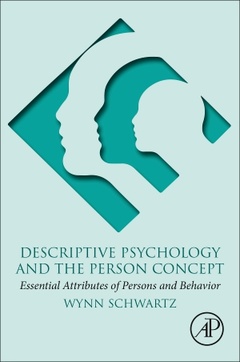Descriptive Psychology and the Person Concept Essential Attributes of Persons and Behavior
Auteur : Schwartz Wynn

Descriptive Psychology and the Person Concept maps the common ground of behavioral science. The absence of a shared foundation has given us fragmentation, a siloed state of psychological theory and practice. And the science? The integrity of choice, accountability, reason, and intention are necessary commitments at the cornerstone of civilization and any person-centered psychotherapy, but when taught along with a ?scientific requirement for reductionism and determinism, reside in contradictory intellectual universes. Peter Ossorio developed the Person Concept to remedy these problems. This book is an introduction to his work and the community of scientists, scholars, and practitioners of Descriptive Psychology.
Ossorio offered these maxims that capture the discipline?s spirit:1. The world makes sense, and so do people. They make sense to begin with.2. It?s one world. Everything fits together. Everything is related to everything else.3. Things are what they are and not something else instead.4. Don?t count on the world being simpler than it has to be.
The Person Concept is a single, coherent concept of interdependent component concepts: Individual Persons; Behavior as Intentional Action; Language and Verbal Behavior; Community and Culture; and World and Reality.
Descriptive Psychology uses preempirical, theory-neutral formulations and methods, to make explicit the implicit structure of the behavioral sciences. The goal is a framework with a place for what is already known with room for what is yet to be found.
1. What is Descriptive Psychology and The Person Concept?2. Individual Persons, Personhood, and the Problem of Definition3. Behavior as Intentional Action4. The Judgment Diagram, Some Categories of Cognizance, and the Unconscious5. Relationships, the Relationship Formula, and Emotional Competence6. Verbal Behavior, Language, and Linguistic Self-Regulation7. Community and Culture8. Reality and the Worlds9. Empathy in Practice: A Demonstration of Some Person Concepts
Afterword and Summary: Satisfaction and the Construction of Worlds or, At the End of the Day, How Does It Feel?Appendix One: Ossorio's Status Dynamic Maxims, Behavioral Logic, and Reminders for Proper Description (Place, 1998)Appendix Two: A Glossary of Descriptive Psychology Concepts Compiled by Clarke Stone
academics and graduate students across the behavioral and social sciences; behavioral and mental health clinicians looking for a framework for coordinating various theories and practices
- Provides a way to compare theories, coordinate empirical findings, and negotiate competent disagreement
- Offers guidance for effective case formulation and integration of therapies
- Explores the dilemmas of personhood and the complexities of human and nonhuman action, investigating "what is a person, and how can we be sure?"
- Follows the implications of Hedonics, Prudence, Ethics, and Aesthetics as intrinsic perspectives and reasons for action
- Applies these concepts to personality and social dynamics, consciousness, relationship change, emotional behavior, deliberation, and judgment
- Provides a guide to establishing and restoring empathy--especially when it's difficult
Date de parution : 05-2019
Ouvrage de 281 p.
15x22.8 cm



